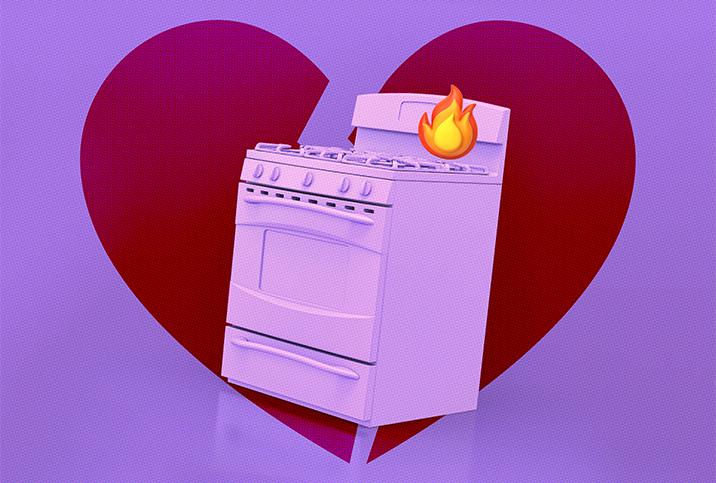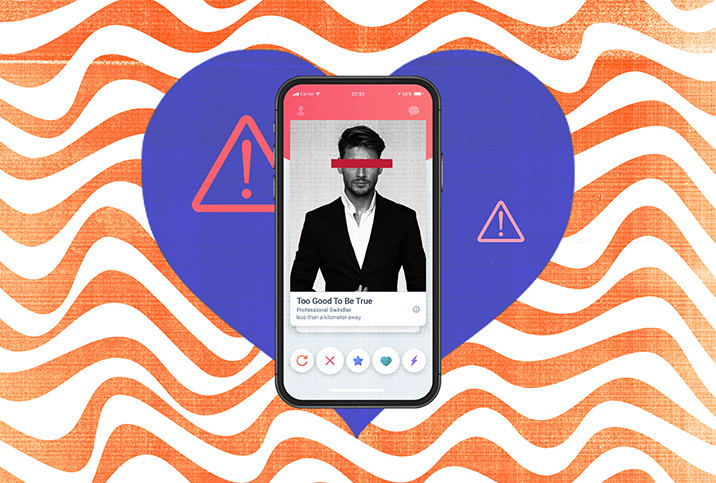Relationships on the Back Burner May Get You Burned

Many of us have "friends" who aren't just friends.
Sparks from the past might keep this almost-romantic friendship on a slow burn, and you may sometimes flirt via text, but neither of you is taking one step further to start a full-fledged romantic relationship. Perhaps it's your ex, with whom you still want to remain friends—only both of you are closer than regular friends. Sort of.
These relationships occur when we maintain communication with people we still might be romantically or sexually interested in. When you're both comfortable staying in this ambivalent zone, you're in what's known as a back-burner relationship.
It happens to most of us
A study on back-burner relationships among young adults published in the 2018 edition of Communication Research Reports surveyed 658 college students. The findings suggested single people and people in long-term relationships had about the same number of back-burner relationships. Single students had an average of about six back-burners, while those in committed relationships had about five, and 72.9 percent of the participants reported keeping at least one back-burner relationship.
The findings shouldn't be completely surprising, given that prior research indicated people continue to notice and monitor attractive individuals even if they're in a happy and committed relationship, according to Jayson Dibble, Ph.D., the lead author of the study and an associate professor of communication at Hope College in Holland, Michigan.
"We know that the mental machinery for noticing attractive people can become blunted while you're in a committed relationship, but it never fully switches off," Dibble said. "This is actually quite normal, and it doesn't mean your partner is cheating on you. Indeed, their 'hottie detector' is what turned your partner on to you in the first place."
Back-burners as 'partner insurance'
If you're moving on from a past relationship and perhaps getting involved in a new, permanent one, why bother keeping that old flame on the back burner?
"Single people might be keenly interested in cultivating potential partners if ever they no longer wish to be single," Dibble said. "But people who are already committed might also keep in touch with back-burners in case they wish their own relationship situation to change. In this latter situation, these back-burners might be serving as a form of partner insurance."
Merri Knox, a certified relationship and dating coach at the California-based platform Relationship Hero, agreed people might keep back-burners "out of fear or comfort," among other reasons.
Dibble observed that the ease and accessibility of communicating digitally through text messages and social media makes it easier for people to maintain back-burner relationships without going out of their way or putting in too much effort. He explained he and his fellow researchers have new evidence that people's most desirable back-burner is commonly a former partner.
'People who are already committed might keep in touch with back-burners in case they wish their own relationship situation to change.'
"Being exes increases the communication frequency versus with back-burners who are not ex-partners," Dibble said. "We interpreted this to represent a sort of fiery limbo that continues to smolder between ex-partners. We haven't tested this idea yet, but we suspect there would be thoughts about unresolved issues and desires with those back-burners."
People who maintain back-burners might start thinking about who they got to be with that other person, as well as the attachment to the potential outcome, Knox said.
"There could also be thoughts of 'What if I don't meet someone else I love this much?'" Knox said.
This scarcity mindset could lead to people wanting to actively keep the communication channels open with their back-burners.
But is it infidelity?
Dibble and his colleagues suspect people's commitment to their existing relationships has less to do with back-burners in general, and more to do with what they communicate to their back-burners.
Dibble noticed that compared to college students, based on recent samples, non-college adults, whose relationships typically involve greater investment and commitment, tend to view their communications with back-burners as bordering on infidelity, especially if they have been exchanging sexually charged messages.
However, the definition of infidelity changes among different people.
"We don't yet see clear signs that keeping back-burners automatically qualifies as cheating," Dibble said. "For some, having back-burners could be a gateway to temptation. For others, back-burners are more or less benign targets of flirtation.
"The issues may have more to do with just how deeply attracted someone is to one particular back-burner, and maybe even whether the primary relationship is already troubled," he added. "Also, if your most desired back-burner is also an ex-partner, that may be a troublesome combination because of the unrequited fiery limbo. And if you're working really hard to hide some super juicy messages from your primary partner, you should expect to feel some stress."
Similarly, Knox feels that maintaining a back-burner relationship may potentially cause mistrust between the couple in the primary relationship.
"It could hold them back from furthering their current connection with their new partner and with themselves," she said. "If a back-burner interrupts a person's ability to pursue new connections or interests, it may not be very healthy or sustainable."
Should you let go?
Knox suggested that anyone who is holding on to back-burner relationships can first start to increase self-awareness by working out what they are actually holding on to. What are your motivations? What are the emotional costs of letting go? What else is possible?
"Drawing boundaries is super helpful when letting go," she said. "It is also very helpful to surround ourselves with personal and professional support."
Dibble recommends discretion over alarm if you're single.
"Single people probably have very little to worry about, since they have no primary partner from whom to hide anything," he explained. "In fact, maintaining back-burners may be a useful part of doing romance. Heck, it was my single days in grad school that inspired me to study back-burners in the first place. We learned that they are really common."
However, Dibble advised people who are in back-burner relationships with ex-partners to exercise greater caution.
"If you're doing it out of fear of being single, you may end up merely replacing those fears with other negative feelings," he said.
And for people in committed long-term relationships, it all boils down to having open communication with your partner.
"Don't assume you're on the same page as your partner when it comes to back-burners," Dibble advised. "Talk to your partner and learn where each of your lines are as well as what behaviors cross those lines."


















